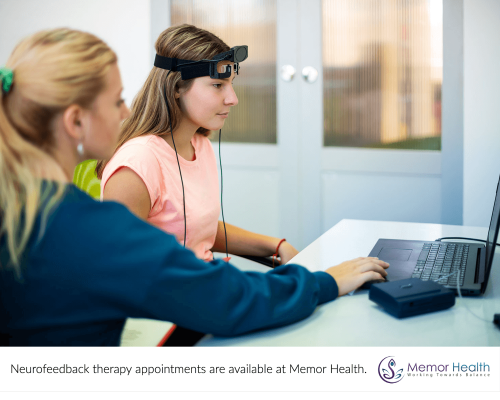Memor Health Now Offering Neurofeedback Therapy to Help ADHD, Anxiety, Depression and More
Memor Health, a compassionate and empowering telehealth and psychotherapy provider, will begin offering neurofeedback therapy in June. Appointments are available for booking.

Reno, Nevada, United States – June 11, 2021 /MarketersMedia/ —
Memor Health’s neurofeedback therapy appointments can be booked here.
Neurofeedback therapy, also sometimes called Neurotherapy, is a type of biofeedback that uses an electroencephalogram (EEG) to retrain the brain. This holistic therapy process can help individuals learn new ways of self-regulating and responding to their environment. By receiving neurofeedback therapy, a person can be more ready to handle stressors, focus better, sleep better, and interact with their environment in a more balanced way.
“Neurofeedback is mostly automatic,” Dr. Yvette Kaunismaki, M.D. and Memor Health founder, said. “The brain is primed to process rewards positively. Therefore, without intention, the brain will seek to achieve states that provide rewards.”
Through neurofeedback, the particular behavior is molded through sound and visual signals, which can be changed by inhibiting certain brain waves and rewarding others. Neurofeedback should always be conducted under the care of a clinically trained practitioner. All of Memor Health’s neurofeedback sessions will be conducted under the supervision of Dr. Kaunismaki, a board-certified psychiatrist.
“Sometimes the brain’s electrical activity can become imbalanced, too active or dysregulated,” Dr. Kaunismaki said. “When that happens, a wide array of disorders can develop. At Memor Health, we can measure and map your brain’s electrical activity to determine what needs to be adjusted for your optimal mental health.”
According to the American Psychological Association, biofeedback is an evidence-based technology, and its therapeutic uses date back nearly 50 years. With an approach based on this science, the providers at Memor Health can measure and map a client’s brain’s electrical activity with an EEG and determine what needs to be adjusted for optimum mental health. Then, neurofeedback techniques are used to correct the imbalances. Neurofeedback therapy can be used to treat a wide array of psychological conditions, including, but not limited to, attention deficit hyperactivity disorder (ADHD), anxiety, depression, autism, insomnia, irritability, learning disabilities, and post-traumatic stress disorder (PTSD). Neurofeedback therapy can also be helpful in peak performance training to improve academic testing, attention, math skills, mood, and reading comprehension.
“Neurofeedback can augment psychotherapy by allowing a person to learn to achieve a more calm and alert state of mind needed to work on the skills learned in psychotherapy,” Dr. Kaunismaki added. “For those who are not interested in medications or who want to decrease or stop their psychiatric medications, neurofeedback may allow this to happen.”
Dr. Kaunismaki emphasized that any changes in psychiatric medications should always be made under the care of the individual’s medication management provider.
How neurofeedback therapy works: The number of neurofeedback therapy sessions a person may require depends on the particular symptoms a client is facing. On average, individuals can benefit from 30 to 40 sessions, though some clients benefit from fewer, and some clients benefit from more sessions. Because all brains are different, it’s difficult to predict how many sessions will be needed. Often people notice benefits within a few sessions, but the goal is not just a reduction in symptoms—it’s also long-term stability.
A thorough initial assessment of the patient gives the provider a better clinical picture of what symptoms are present. Based on the evaluation, Memor Health’s practitioners will develop an initial treatment plan.
During neurofeedback therapy, the particular behavior and associated brain wave patterns will be molded through sound and visual signals, a process called operant conditioning. By inhibiting certain brain waves and rewarding others, a person can change their state of mind from over-thinking and feeling on edge, for example, to a more calm and alert state.
Training typically begins with twice-a-week sessions. However, three to four times a week can be helpful for clients in crisis, clients with severe dysregulation, or clients who wish to train faster. Typically, sessions decrease to once a week, then every other week as symptoms improve.
Neurofeedback may also be used in combination with psychotherapy or talk therapy. While the two modalities can work well together, they do not replace each other. As neurofeedback training improves brain function, other emotional and psychosocial factors can be better helped through psychotherapy.
Memor Health offers psychotherapy and medication management in a compassionate and healing environment. They are located at 10405 Double R Blvd., Reno, NV 89521. Patients in Reno, Sparks, and other Northern Nevada locations can easily access their services, including cognitive behavioral therapy (CBT), eye movement desensitization and reprocessing (EMDR), medication management, neurofeedback therapy, psychotherapy, teletherapy, telepsychiatry, telehealth, therapy and more. To book an appointment for this new service, click here or call 775-827-2400 to contact us with questions.
Contact Info:
Name: Milla Stanton
Email: Send Email
Organization: Memor Health
Address: 10405 Double R Blvd, Reno, NV 89521
Phone: 775-827-2400
Website: https://memorhealth.com/
Source: MarketersMedia
Release ID: 89024157